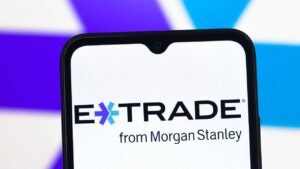Robinhood vs. Webull

Key takeaways
- Online brokers Robinhood and Webull both offer zero-commission trading on stock and ETFs.
- Neither broker has an account minimum nor offers access to mutual funds, bonds and foreign-exchange trading.
- Webull may suit investors who want detailed charts and paper trading. Robinhood can be a good fit for more experienced investors who want lower options costs and margin trading.
Robinhood and Webull are two of the most popular investing apps, and millions of users have flocked to them for their ability to quickly trade and track stocks, options and cryptocurrency.
Robinhood is great for no-cost trading, a slick mobile app and fractional shares, but it’s been dinged for its inability to always keep its service operational.
Webull competes favorably with Robinhood in a number of key areas, if not beating its rival. Webull, too, has useful charts and retirement accounts, offers fractional shares and still gets the trading job done with no commissions.
Our take
So is Robinhood or Webull a better online brokerage option for you? That depends not only on what each broker offers but also on what features you truly need. Here’s how these apps compare on some of the most common features.
| Broker category | Robinhood | Webull |
|---|---|---|
| Stocks and ETF commissions | $0 | $0 |
| Options commissions | $0 per contract | $0 per contract, with modest regulatory fees |
| Account minimum | $0 | $0 |
| Tradable securities | Stocks, ETFs, options, cryptocurrency | Stocks, ETFs, options, cryptocurrency, futures, Treasuries |
| Account fees | $100 transfer-out fee | $75 transfer-out fee |
| No-transaction-fee mutual funds | None | None |
| Account types | Individual taxable accounts, IRAs (traditional, Roth and rollover) | Individual taxable accounts, IRAs (traditional, Roth and rollover) |
| Mobile app | Yes, Apple App Store and Google Play Store | Yes, Apple App Store and Google Play Store |
| Fractional shares | For purchases and dividend reinvestment | For purchases and dividend reinvestment |
| Customer support | Email, phone and 24/7 chat with live agent | Phone, email and in-app chat |
Fees
Edge: Webull, for lower account costs plus the benefit of disclosure for crypto trading. If options are your thing, however, Robinhood may be the better choice.
Robinhood was the investing app that kicked off the no-cost trading frenzy for stocks, ETFs and options and then added cryptocurrency trading to the mix, too. But an able competitor has emerged in Webull, which offers many of the same no-cost trading features.
Options: While most online brokers now allow zero-commission trading of stocks and ETFs, too, Robinhood and Webull offer that and no-cost trading for options, a real differentiator. That compares to the industry standard of $0.65 per contract, though some brokers offer discounts for high-volume traders. Robinhood is a wee bit cheaper here, since it absorbs regulatory fees that Webull passes on to clients, a total of about 5 cents per contract.
Crypto: Both brokers offer cryptocurrency trading with no out-of-pocket costs, though you’ll implicitly pay a spread markup on any transactions, so it’s more like the costs are hidden in the trading price. Of course, there’s nothing uncommon in this pricing structure, as it’s typical in foreign-exchange (forex) markets.
Here, Webull wins points for publicly disclosing its spread markup (100 basis points, or 1 percent of the trade value). Robinhood does not reveal how much you’ll pay via the spread, however, only how much it receives in rebates for every $100 in crypto that you trade: $0.85. So, trading prices on Robinhood may be affected more or less than on Webull. (Technically, Webull has moved its crypto operations to a separate app called Webull Pay.)
Generally, both brokers are comparable in terms of account costs, with no activity fees or ongoing account fees. Both charge a transfer-out fee — $100 in the case of Robinhood and $75 for Webull — while at least one big broker, Fidelity Investments, charges nothing. So you won’t notice this fee until you’re ready to leave either Robinhood or Webull and need to move securities out of your account.
Tradable securities
Edge: Even, Robinhood and Webull offer the same slate of tradable securities.
Robinhood and Webull cater to the most popular trading categories, meaning that they don’t offer some other securities that are usually offered at other brokers (forex, bonds and mutual funds, for example). Instead, these investing apps stick to stocks, ETFs, options and crypto.
That’s a clear downside for traders looking to get involved in some of these other sectors of the market, but the vast majority won’t need those sectors to amass a comfortable nest egg. So, this narrowed selection will still work well for most investors.
That said, a clear negative is that neither Robinhood nor Webull offers trading in mutual funds, which may not be a deal breaker if you’re only choosing these brokers for short-term trading. But investors looking for mutual funds will want to turn to a top broker with an offering in that area.
Account types
Edge: Even, Robinhood and Webull offer the same limited types of accounts.
Robinhood and Webull both offer the same restricted set of account types: individual taxable accounts, IRAs (traditional, Roth, rollover) and joint accounts.
Robinhood and Webull also both offer an IRA match. Here’s how they work.
-
Robinhood: You can get a 1 percent or 3 percent match on your annual IRA contributions depending on if you have Robinhood Gold or not. Robinhood Gold is a premium membership that costs $5 a month or $50 a year. The match adds $70 without Gold or $210 with Gold to your account if you’re under 50 and max out your contributions. You can get a 1 percent match on IRA transfers, too.
-
Webull: Investors who don’t subscribe to Webull Premium get a 1 percent match on IRA contributions. With Webull Premium, your contributions are matched at 3.5 percent and IRA transfers are matched at 3 percent. Webull Premium costs $3.99 a month or $40 a year. Your contributions would earn $70 or $245.
If your financial needs expand beyond these accounts, you’ll likely need one of the bigger brokers that offers a more comprehensive set of accounts, such as Charles Schwab.
Fractional shares
Edge: Robinhood, by a fractional share since you can get started for $1 and buy smaller fractions of stock.
Robinhood and Webull both offer fractional shares and allow you to reinvest dividends in stock and invest directly in stock with fractional ownership. That combination is not something that many large brokerages, such as E-Trade or Merrill Edge offer, though these latter brokerages do permit dividend reinvestment.
Robinhood lets you invest with as little as $1, and it can divide stock into chunks as little as one-millionth (0.000001) of a share. Robinhood allows partial shares in all but the smallest stocks and those trading below $1 per share. So, Robinhood sits among the best brokers for fractional shares.
Webull lets you invest in fractional shares with as little as $5 and dividend reinvesting starts at $1 with stocks broken down to one-hundred-thousandth (0.00001) of a share.
Customer support
Edge: Even, Robinhood and Webull both provide various ways to get help.
Webull and Robinhood are closely matched here.
-
At Robinhood, you’ll be able to chat with a live agent 24/7 or by phone from 7 a.m. to 9 p.m. ET, email customer support or consult with its sometimes-useful FAQs.
-
Webull customer support is available by phone, email and in-app chat. It also has an online help center for more routine questions.
Neither investing app has any physical branches for customers who need in-person support.
Other factors
- Instant account funding: Robinhood and Webull both offer instant funding of accounts, allowing you to get an initial credit of up to $1,000 as the broker waits for your bank transfer to arrive.
- Interest on uninvested cash: Robinhood and Webull both pay a competitive interest rate on uninvested cash — if you have the premium membership.
- Research tools: While Webull offers only limited research, it provides a nice suite of charting tools and a few dozen technical indicators. Even if you don’t use these tools much or at all, it’s an impressive visual experience. At Webull, you can hone your trading chops with a paper money account that gives you $1 million in virtual cash and lets you run wild on the trading platform. But Robinhood has upped its chart game over the last year, with key technical indicators, and also offers screens to help you find the stocks hitting certain benchmarks.
- Margin accounts: Robinhood’s margin fees for regular customers are cheaper than Webull’s, starting at 5.75 percent vs. 8.74 percent for the lowest amounts, respectively. Robinhood Gold and Webull Premium customers get a break on margin rates. With Robinhood Gold, the first $1,000 of margin trading is included with your subscription, then the regular tired rates kick in. With Webull Premium, the sliding rate scale starts at 5.95 percent.
Bottom line
Robinhood and Webull run a dead heat in so many categories that it can be tough to call a winner. If you’re looking for an easy-to-use investing app, either will do nicely. So your needs are likely to be the deciding factor in which is better. If you need slick charting and a paper trading account, Webull may be your choice. If you need lower-cost margin or overall lower options costs, you might opt for Robinhood. That said, opening multiple brokerage accounts can have some key benefits too.
Why we ask for feedback Your feedback helps us improve our content and services. It takes less than a minute to complete.
Your responses are anonymous and will only be used for improving our website.






